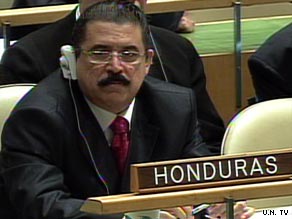
The United States put some teeth in its diplomatic signals to Honduras Thursday, stopping some aid programs temporarily to the Latin American country as it grapples with its two-president crisis.
State Department spokesman Ian Kelly said the United States already “hit the pause button” on some aid programs, even before State Department lawyers make a final ruling on whether to halt assistance. The United States continues to hope the Organization of American States quickly will hammer out a compromise between ousted President Jose Manuel Zelaya, forced out of Honduras last weekend, and the man who took his job, provisional President Roberto Micheletti. Zelaya earlier said he would defy the new government and return to the Honduras capital of Tegucigalpa on Thursday. He later postponed that to Saturday, to allow the OAS negotiations to proceed. The United States Thursday warned that Zelaya could become “an obstacle” to resolving the crisis if he returned too early, and some observers said the crisis could slide into next week. This would allow OAS leaders to go to Honduras, and return for consultations at OAS headquarters in Washington after the July Fourth weekend. Watch Zelaya supporters take to the streets » “Our goal is the restoration of constitutional order in Tegucigalpa, which means the restoration of President Zelaya. There is a process led by the OAS which is in place,” Kelly said at the State Department at his afternoon briefing. “We think that this process should be allowed to play out, and we would discourage any actions that would prove to be an obstacle to this process reaching its desired outcome — which is of course the restoration of Manuel Zelaya in power.” Asked if a premature return of Zelaya could be an obstacle, Kelly said, “It could be. What everybody needs to focus on now is the OAS mission, mandated by the OAS special assembly.” Zelaya appeared to signal his willingness to compromise when he told the United Nations General Assembly earlier in the week that he would agree to step aside when his term ends in November. His interest in overturning a one-term limit under Honduran law had led to the present crisis and his ouster, despite efforts by the United States and others to avoid a showdown. And Kelly said despite the U.S. government holiday Friday, and the closure of State Department offices in Washington, that U.S. officials would be monitoring the Honduras crisis. “Absolutely, very much so,” Kelly said. Kelly said State Department lawyers were evaluating events in Sunday’s coup in Honduras to see if they trigger a formal halt to aid, under the Foreign Assistance Act. “The legal review is ongoing,” Kelly said. Although the Honduran military seized President Zelaya and sent him to neighboring Costa Rica there is difficulty in determining whether civilian political leaders were in charge and whether to define this as a military or political coup.
“In the meantime we have taken some actions to hit the pause button, let’s say, on assistance programs that we would be legally required to terminate,” if the events were determined to be a military coup, Kelly said. It is unclear how much aid could formally be suspended or ended outright. Earlier the State Department said the United States gave Honduras more than $40 million in assistance last year, for a variety of purposes, including development, health assistance, anti-drug work and global peacekeeping operations.